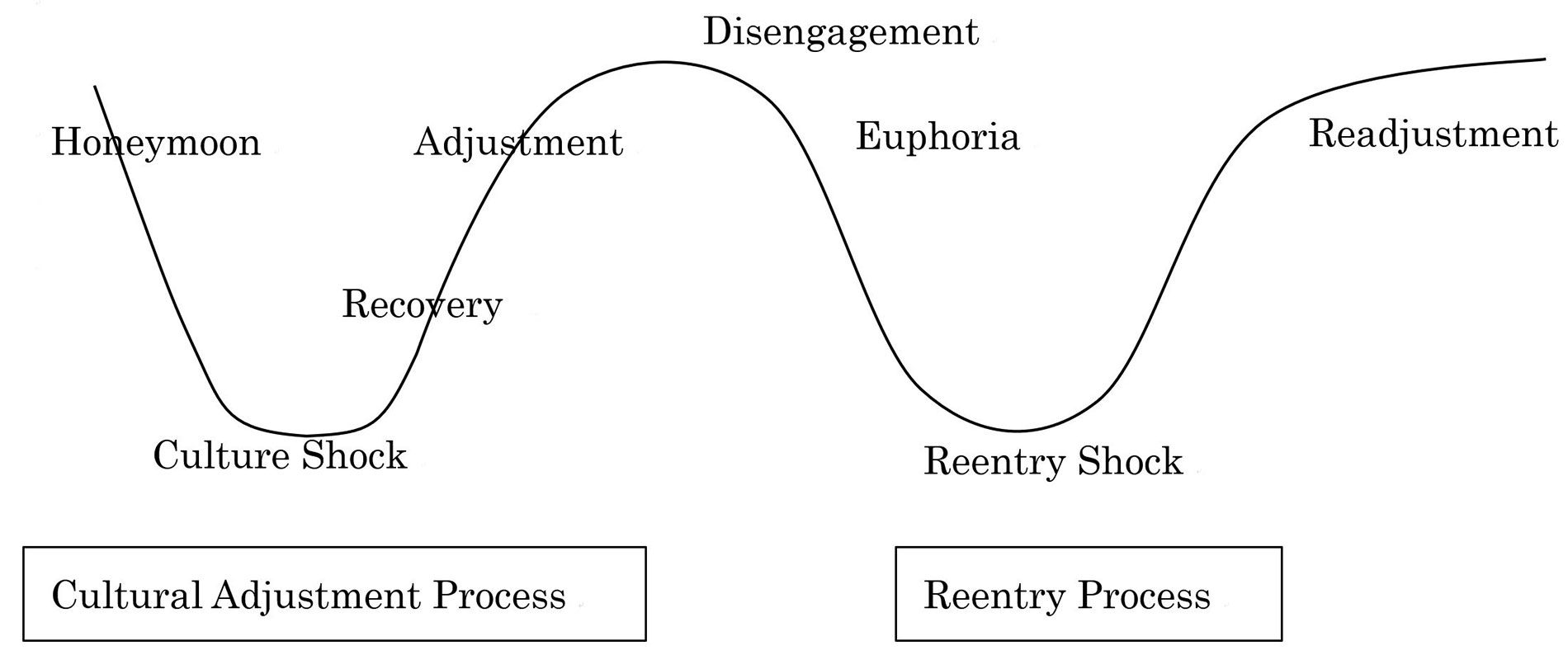If you are returning to your home country, you may experience difficulties in re-adapting to the realities in your home country. While in Japan, many international students go through a process of re-examining their cultural identities, life style, values, and opinions about their country. Upon reentry to your country, you may find many things are different from how you remembers them. While you think more favorably about Japan, you may be critical of your country. Just like the cultural adjustment process, the reentry process can differ significantly from person to person. You may have no major readjustment issues, or you may experience sever distress in a way you would not have expected.
In this section, you will learn the process and challenges of reentry and how to cope with reverse culture shock you may experience upon return to your country. The process of reverse culture shock can be described in the following stages.
The Reentry Process
Stage 1: Disengagement
While you are still in Japan, you begin to start thinking about moving back to your country and leaving your overseas experience and friends. You are emotionally preparing yourself for reentry.
Stage 2: Initial Euphoria
You are excited to be back in your country and your family and friends are delighted to have you back. At the beginning, people will politely listen to your stories, but you may soon find that they are ready to move on to the next topic and are not as interested in your overseas experiences as you had hoped.
Stage 3: Reentry Shock
You may experience dampened euphoria and even feel like a stranger at home. Your home country may have changed in your eyes. The gap between expectations and reality may result in frustration, feelings of alienation and mutual misunderstandings between you and your friends and family.
Stage 4: Gradual Readjustment
During this stage, you will begin to gradually readjust to life at home. You become fully involved with friends, family, and activities again and feel integrated back into the society. Many people at this stage realize the positive and negative aspects of both countries and have a more balanced perspective of their experiences.
Note: Not everyone will go through the same stages.
Common Problems of Reverse Culture Shock
While there are large individual differences in the readjustment experience, some believe that the better integrated one has become to the host country’s culture, the harder it is to readjust during re-entry. Here are some of the common challenges in reentry.
- Stress and frustration that you have to struggle to re-adapt to your own culture
- Sense of loss; because of the social changes in the nation, you may not be able to regain your job, status, and friends at home.
- Feeling rejected by friends and family; they may not be interested in your overseas experience or may not realize how much you have changed.
- Identity confusion; because you have changed so much that you are uncertain where you fit in.
- Sadness for losing a familiar lifestyle
Tips for Reentry Adjustment
As you continue your journey, you will learn how to integrate the changes you have made and the cultural norms of your country. You will attain a balance between two cultures. To help your reentry adjustment, we share the following suggestions:
- Be aware of signs of reverse culture shock. If you experience severe reentry stress, do not hesitate to ask for help from an appropriate professional in your country such as a counselor.
- Stay connected with the people you befriended in Japan.
- Find people and opportunities that you can share your overseas experiences.
- Express your thoughts and feelings through journal or blog writing.
- Try to be patient with your friends and family who may not understand your experience.
- Watch movies and read books in your native language.
- Participate in international activities in your home community.
- Remember what you have accomplished in Japan and be proud of yourself.
International Student Counseling Office TOP Useful Resources


